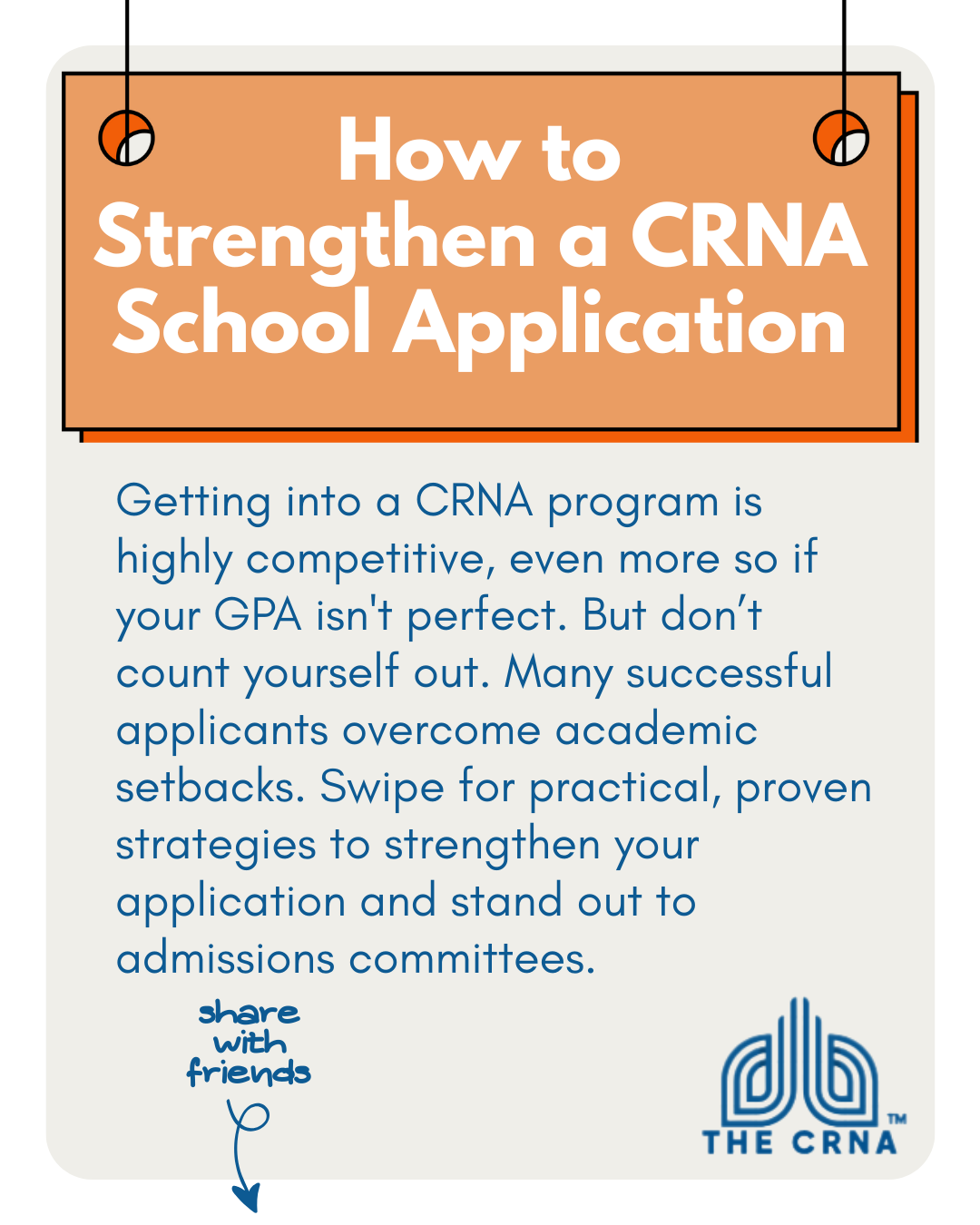Getting into a CRNA program is highly competitive, even more so if your GPA isn’t perfect. But don’t count yourself out. Many successful applicants overcome academic setbacks. Swipe for practical, proven strategies to strengthen your application and stand out to admissions committees.

1. Retake Science Courses and Get All As
Especially A&P, Organic Chem, Biochem, and Micro. Many programs weigh recent grades heavily.
- Prioritize the most recent and relevant courses — Admissions committees look closely at A&P I & II, Biochem, Organic Chemistry, and Microbiology.
- Take courses through reputable programs or local universities that are accepted by NursingCAS.
- Aim for As, not just passing grades — programs often replace old grades with new ones if the exact course is retaken.
2. Classes Too Old? Retake Them.
Most CRNA programs require science courses from the last 5–7 years.
- Check each program’s prerequisite expiration policy — some are strict about the 5-year rule.
- Look for accelerated or 8-week online options to retake outdated classes efficiently.
- Use post-bacc or extension programs that issue transcripts eligible for NursingCAS (e.g., UCSD, UNE Online).
3. Personal Statement Tips
Keep it concise (2 pages max), tailored to each school, and show why you’re applying there.
- Avoid generic writing — directly reference the program’s strengths and how they align with your goals.
- Showcase your story with clarity — highlight critical experiences that led you to pursue CRNA.
- Proofread carefully — always double-check the program name, grammar, and that it answers their prompt.
4. GPA Isn’t Everything — But Science GPA Matters Most
Holistic admissions are rare. Many accepted applicants have a strong last-60-credit or science GPA.
- Focus on raising your science GPA with fresh As — many schools let you rebuild a weak academic history.
- Apply to schools that weigh last 60 credits more heavily if your cumulative GPA is lower.
- Use your resume, certs, and experience to help offset GPA weaknesses, but don’t skip the academic improvements.
5. Grad Courses Are Optional — But STEM Credits Help
Post-bacc courses are affordable and often accepted by NursingCAS.
- Two concurrent STEM graduate-level courses can demonstrate readiness for rigorous academic work.
- Choose challenging but relevant subjects, like pharmacology or pathophysiology, if grad-level courses are considered.
- Keep your grades high in these courses — they’re closely reviewed as predictors of future performance.
6. Certifications & Resume Matter
Add CCRN (a must), BLS, ACLS, PALS, etc and highlight leadership & committee involvement on your resume.
- You must have multiple specialty certifications like BLS, ACLS, and PALS, and CCRN.
- Join and participate in unit committees to demonstrate leadership.
- Structure your resume to showcase ICU experience, teamwork, and outcomes — keep it professional and metrics-driven.
7. Interview Prep Is Crucial
Once you land interviews, invest in coaching or mock interviews — many great candidates lose here.
- Practice answering clinical and behavioral questions — focus on safety, autonomy, and critical thinking.
- Record yourself during mock interviews to catch filler words or unclear responses.
- Consider a CRNA interview coach or prep program to improve confidence and delivery.
8. Network with CRNA Programs
Attend events or enroll in programs like AANA Congress, Diversity CRNA, or CRNA Prep Academy for exposure + connections.
- Introduce yourself to faculty and current SRNAs at events — these impressions can matter.
- Use networking opportunities to get honest advice about program culture, strengths, and weaknesses.
- Follow up with people you meet — even a thank-you email can keep you top of mind when you apply.
9. Cast a Wide Net
There are over 150 CRNA programs. Be willing to relocate and apply broadly to increase your odds.
- Apply to at least 6–10 programs if your GPA is below average — this increases your chances.
- Don’t limit yourself geographically — out-of-state or lesser-known programs can still be excellent.
- Target programs with holistic or last-60-credit admissions models, especially if your early GPA is low.
10. You Can Do This!
If others got in with less-than-perfect GPAs — you can too. Focus on the things you can control.
- Stay consistent and disciplined with your plan — GPA recovery and prep take time.
- Control the controllable — grades, personal statement, interview prep, and certifications.
- Don’t give up after a rejection — many applicants succeed on their 2nd or 3rd try.


